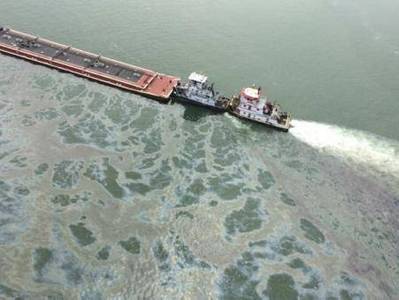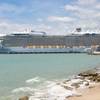Crashes in Crucial US Crude Waterway Hit 10-year Low
Serious crashes in the bustling Bay of Galveston have fallen to the lowest level in a decade even as more oil moves on U.S. waterways, official data show, suggesting that better training and equipment are helping avert spills like one in March.
The number of crashes in the Texas bay, home to the Houston Ship Channel and the country's heaviest crude, fuel and chemical ship traffic, fell 68 percent to eight in 2013 from 25 in 2011, according to U.S. Coast Guard data obtained by Reuters through the Freedom of Information Act.
But the March 22 crash of a Kirby Corp. oil barge that hit another ship and spilled 4,000 barrels, or 168,000 gallons (636,000 liters) of fuel oil into the bay, raised fresh safety concerns. The spill, one of the bay's worst in a decade, happened despite improvements to radar and satellite systems and boat design.
Though nearly all single-hulled oil barges have been retired before a rule requiring two hulls goes into effect on Jan. 1, 2015, the new ones are not totally safe. Kirby's 78-foot Miss Susan has two hulls, like all of its oil barges.
"There is a certain point of no return. If you go through one, you go through two, depending on the speed, velocity and other factors," said Ken Eriksen, senior vice president of transportation at Informa Economics, a Memphis-based commodities research firm.
He said tank barges in operation nationwide rose 7 percent to over 3,400 in 2013, while the number of dry barges for grain and other bulk commodities shrunk some 1.5 percent.
Barge traffic has climbed as U.S. oil production, now at a 25-year high, outpaces pipeline construction. That means crude increasingly moves by barge and rail to the Gulf Coast, home to 40 percent of U.S. refining capacity.
The collision also put pressure on Kirby's stock price, which dropped as much as 7 percent in the days after the spill.
Maritime rules usually force operators to cover cleanup expenses.
Miss Susan's Record
The Miss Susan has had 17 safety incidents over the last decade, according to the U.S. Coast Guard Maritime Information Exchange and the company's Kirby Inland Marine subsidiary.
Seven were minor crashes, four were mechanical issues, and six were groundings that may have been intentional, Kirby said.
"Seventeen reports over a 12-year period is not generally inconsistent with standard industry frequency rates for a towing vessel, particularly given Kirby's practice to report even minor operational issues," Kirby spokesman Greg Beuerman said.
Though the Coast Guard data showed fewer crashes in the bay, the number of reported safety incidents hit a 10-year high last year, rising 86 percent to 264 in 2013 from 142 in 2012.
The Coast Guard defines incidents as crashes such as collisions and allisions, along with losses of power or steering, groundings and other mishaps like fires. Allisions are crashes in which a boat hits a fixed object or a moored ship.
More incidents could be random, the result of companies encouraging employees to more actively report safety issues, or low tides and strong winds causing more ships to ground in shallow water, Coast Guard officials and shipping analysts said.
The Coast Guard did not say how many crashes or incidents involved ships carrying oil or fuel in the bay, which includes the ports of Houston, Bayport, Texas City and Galveston.
Officials say safety practices have improved since the 1989 Exxon Valdez spill and the 2010 Macondo well blowout in the Gulf of Mexico, the biggest offshore spill in U.S. history.
With pilots and dispatchers coordinating a flurry of arrivals and departures, sometimes in fog, the data showed only about 0.17 percent of ships had safety incidents or crashes out of 159,479 transits in the bay last year.
(By Anna Louie Sussman and Terry Wade; Editing by Jan Paschal)











